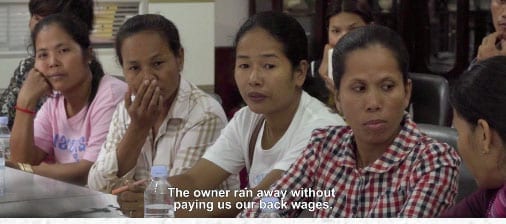Knowing that conditions in garment factories around the world should be improved is not the same as seeing those workplaces firsthand and talking with garment workers about their daily experiences on the job, as three Parsons Design students found out when they traveled from New York City to Cambodia.
“Hearing their stories, and seeing that they are more than just a number, was something that was really eye-opening,” says Allison Griffin, a dual fashion-journalism major who took part in a video project by Re/Make, a U.S.-based non-profit organization focused on ethical production of clothes and other other garments.
Griffin, Casey Barber and Anh Le, all of whom graduated last week, met last fall with garment workers like the woman who described the high penalty she faces for making a mistake when assembling garments.
“If there are 12 pieces and I forget to put a code on one piece, they don’t pay me for any of them,” she says. “I get nothing for that day.”
She is among some of the more than 200 women whose employer last July abruptly closed the knitwear plant where some of them had worked for up to 18 years, leaving the workers without jobs or the more than $500,000 in compensation owed them.
Low Wages, Unsafe Conditions for Workers in Global Supply Chain
The tragedy of their story goes beyond a single knitwear plant in Phnom Penh. Workers throughout the global supply chain that fuels multinational corporations often face poverty wages, dangerous and unsafe working conditions, eroding rights on the job—and employers who find it all-too easy to abandon a plant in one country, only to open another elsewhere.
The students also met Sreyneang, a garment worker who invited the students to her home, where they met her two daughters whom she is supporting because her husband is unable to work.
“Every day when I finish my work (at one factory), I have to work at other factories until 9 or 10 p.m.,” says Sreyneang. “I walk home late.”
Sreyneang expressed hope the video can help improve the working conditions of Cambodia’s garment workers.
“It’s a lot to handle,” says Barber, speaking through tears on the video. “But hopefully we can make people understand and make change.”

